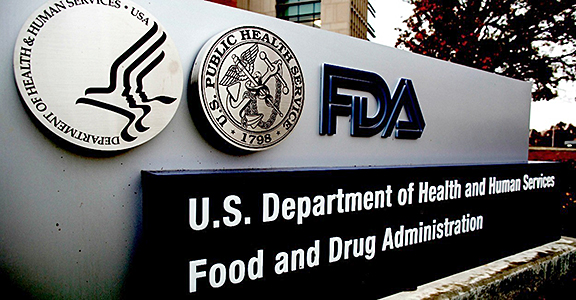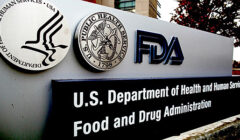The FDA Is Off The Rails
Like everyone else I would love to believe that the government is in place to protect citizens and provide services but unfortunately as I get older and maybe a wee bit wiser I see the things are not as cut and dried as I’d hoped. This is, unfortunately, especially true in medicine because the medical schools and the residency programs are not driven by science alone. 
You can no longer have full faith and trust in the federal government agency in charge of medications and treatments. I’m not writing about the incredibly incestious relationship between the pharmaceutical industry and the FDA. That’s about politics and this column is about facts. The FDA is approving drugs based on surrogate markers, not actually patient relevant result. This isn’t a one time thing…I will show multiple very recent examples. I don’t want to be the guy critical of big government and big pharma but this stuff could potentially affect a lot of patients and people aren’t getting this perspective readily elsewhere.
Here’s a great excerpt from an article published in one of the many JAMA variants entitled, ‘Review Of Evidence Supporting US FDA Drug Approvals.’ “Our results highlight a trend toward less rigorous standards for novel drug approvals that has evolved over the past few decades. In contrast to 2016, when 4 of 20 products (20%) were approved based on a single trial, single studies justified 65% of the 2022 approvals. In 2016, 55% of products were approved based on 3 or more studies, in comparison with 11% in 2022.” The long and the short of this is that drugs are being approved with less and less rigor all the time. I’m going to give three examples from three different fields of medicine on how broken the system is. This review also pointed out that despite the regulatory requirements, many drug trials do not get published so the real world efficacy of these drugs cannot really be easily ascertained.
One of my main complaints when reviewing these drug trials is all the fun and games they play with statistics…using composite and surrogate endpoints and misleading doctors with relative differences instead of absolute difference. For example if there is a drug trial with 1,000 people in each arm of the trial…test drug and placebo, let’s say the test drug group had one heart attack and the placebo group had two heart attacks. Using relative risk you can say the drug cut the risk of heart attack by 50% but using absolute risk its one person in a thousand that benefits. What if the test drug group had more cancer diagnosis…would they have to report that? Not really. I look for the ONE marker it’s hard to hide during any trial…the number of deaths. The number of lives saved. Any important drug…a pill for heart disease, stroke, or diabetes should be measured not by how much lower your blood pressure is, how low the cholesterol number goes but by seeing that patients taking these drugs had less deaths. Lowering death rates, to me, is the most important marker of a drug’s effect.
Unfortunately, modern medicine has become so specialized that doctors lose focus on the big picture and just focus on their specialty. The neurologists don’t care if the drug they give you might increase heart attacks or increase cancer risk as long as it decreases stroke they are all for it. If you have a stroke the neurologist will want you on a statin because they have been shown to lower risk of recurrent stroke. The SPARCL study…High-Dose Atorvastatin after Stroke or Transient Ischemic Attack | NEJM used the highest dose of lipitor to show that it reduced recurrent strokes in patients who had a stroke. Lipitor did indeed reduce strokes…by 2.2 percent but it doubled the number of hemorrhagic strokes which are usually worse than the more common ischemic stroke. Also total deaths and cancer deaths were HIGHER in the statin treated group. So the drug makes the neurologist happy but using the highest dose of the drug had ZERO effect on whether you lived or died.
Sticking with cholesterol for the moment, let’s look at another recently approved drug, Bemedoic acid marketed as Nexletol. This drug was approved after only one trial that involved 13,970 patients. The FDA likes this drug because it lowers cholesterol. This next quote comes directly from the published trial, “Bempedoic acid had no significant effects on fatal or nonfatal stroke, death from cardiovascular causes, and death from any cause.” That’s right, no effect on stroke, heart attack or death from any cause! And yet the drug was approved!
The FDA also approved Repatha, Evolocumab and Clinical Outcomes in Patients with Cardiovascular Disease | NEJM. This is another class of drugs designed to lower cholesterol and thereby lower heart attack and death rates due to CAD. This is a very expensive class of meds (monoclonal antibodies which need to be injected) and lowers cholesterol dramatically. Despite lowering cholesterol by an average of 60% (which is a huge reduction) there was only a slight reduction in heart events from 11.3 % to 9.8%, there were more deaths in the group given the drug. How can the FDA approve ANY drug or intervention if the treated group has more deaths?
Speaking of more deaths in the treatment group. An independent analysis of Pfizer’s original covid vaccine trial showed also there were more deaths in the group of people who got the original vaccine than in the group who got placebo.
Here’s a slide from the CDC itself showing this:
C4591001 COVID-19 BLA Safety and Efficacy Data For ACIP
How can you make it a mandatory vaccination if more people died in the treatment group than in the placebo group? I guess the infectious disease doctors would say…at least you didn’t die of Covid.
Finally, and I could go on and on with examples, we have the new drugs for dementia. Now, dementia is a real and growing problem in this country and elsewhere and we have had a real dismal track record of drug treatments for this with hundreds of trials not producing meaningful results. Big Pharma is focused on the plaques in the brain which can be seen on scans. We now know these plaques are a sign of the disease not the cause of the disease. Aducanaumab was the first approved drug in 2021 but is already being taken off the market by the manufacturer Biogen. Lilly has a drug, Donanemab, which did not get approved in January 2023. Finally there is Lecanamab made by Eisai which was approved July 2023. Like the other drugs, Lecanamab had very little clinical benefit, had significant side effects (i.e. bleeding in the brain) and made an important subset of demented patients worse! Somehow this doesn’t matter to the FDA but it does to me. I’m not sure what to do about all this except remain skeptical as always. Don’t be so quick to look for an answer to your health problems from a pill, look at your lifestyle. That’s where the real changes have to be made. Until next month…get well and stay well …JT BARRY MD










